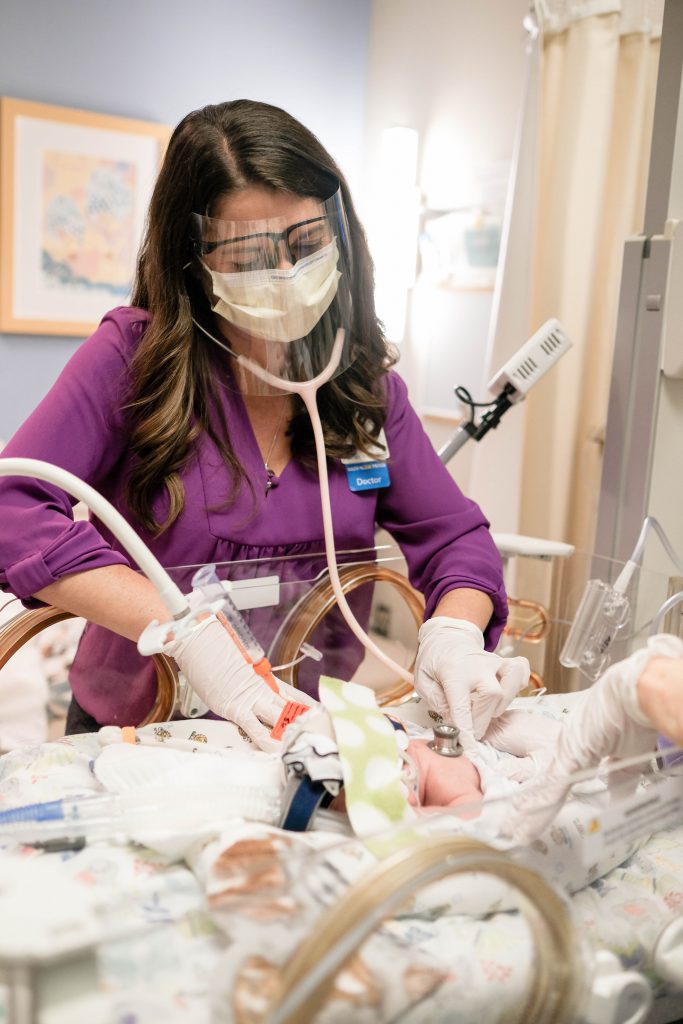One of the most common reasons a newborn ends up in the neonatal intensive care unit (NICU) is because they are born prematurely, requiring around-the-clock monitoring and care. Our integrated team gives the best care for babies in our community, with nearly 500 doctors, surgeons and pediatric specialists, we’re the largest in Minnesota — and one of the largest in the country. We have nearly 200 neonatal beds in our hospitals and special care nurseries, welcoming approximately 3,000 babies every year.
We take great pride in every newborn who graduates from the NICU, but that’s truly just the beginning of their journey. Unfortunately, many premature babies face a range of challenges, including staying on track with growth milestones, delays in speech and fine motor development, and learning differences and disabilities, just to name a few. That’s where Children’s Minnesota’s Intensive Care Follow-up Clinic comes in.
“As recently as the 1970s, babies born even just a few weeks prematurely were not likely to survive,” said Dr. Miller. “Neonatology and pediatrics as a whole have come so far, thanks in part to clinics like ours around the country that have been able to observe, treat and address a myriad of concerns that come with being born prematurely.”

The appointment
For babies with complex or acute health needs, their first follow-up appointment is typically four to six weeks after being discharged from the NICU; more stabilized babies visit about four to six months after discharge. Subsequent checkups are recommended on a yearly basis, but do not replace well-child visits with a primary care pediatrician.
The typical follow-up clinic appointment includes the following:
- A neonatologist or nurse practitioner performs a neuromuscular examination and takes a health history.
- An occupational therapist, physical therapist or an educational psychologist performs an additional examination to check the patient’s development.
- A program staff member discusses the findings of the development evaluation. Any evaluations or recommendations made by the staff are sent to the child’s primary care doctor.
Our goals
The ultimate goal is to diagnose and address challenges as soon as possible to ensure premature babies have every opportunity to catch up with their term-born peers. Unique to Children’s Minnesota, the clinic also offers IQ testing with a clinical psychologist and sees patients up to 5 years of age; many programs graduate patients at 2-3 years old, a key age in development.
While a vast majority of the clinic’s patients are Children’s Minnesota NICU grads, the clinic does treat children from other health care systems whose doctors are concerned about their development or who spent time in a different NICU, but their families have since moved to Minnesota.
The Intensive Care Follow-up Clinic collaborates with the patient’s primary care pediatrician, their future school district, and Help Me Grow Minnesota, a state funded program that partners with local service agencies on early intervention and special education services for children beginning at birth. Together, all parties work to assess a child’s needs, connect the patient family with the right providers, address their concerns, and prepare them to be happy and healthy kindergartners.
The Barich family
The Barich family is no stranger to the NICU. Both Isaac (4 years old, born at 28 weeks) and Lillian (3 years old, born at 25 weeks) were born prematurely. Isaac and Lily spent a combined 180 days in the NICU, both dealing with complications from having underdeveloped lungs.
“These were very challenging times for our family. We were juggling a lot,” said Chang, Isaac and Lily’s mom. “Despite it all, what I remember most is the amount of support the Children’s Minnesota NICU offers. The Ronald McDonald House, various kinds of therapy, social workers, activities for older siblings, vouchers and meals, I could go on.”

For many families like the Barichs, their NICU stay begins the pipeline of support that continues throughout their child’s formative years of development. The Barichs have stayed on track with yearly visits that have uncovered areas where they could use an extra boost. Lily has taken advantage of occupational therapy to develop fine motor skills and hand-eye coordination, and Isaac has been paired with a speech pathologist to help overcome communication challenges. Isaac has recently graduated from the program and looks forward to starting school; his little sister Lily is following in his footsteps.
“While each child is so different, I would tell parents of premature babies that there is a light at the end of the tunnel,” said Chang. “Take advantage of the resources available to you, especially the Children’s Minnesota staff who are all a wealth of knowledge. The care they can provide, both in the NICU and after, is remarkable. They have been great partners as we raise our little ones.”
